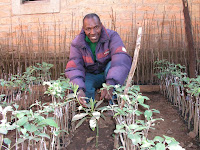CONSERVING INDIGENOUS and wild trees is now a viable economic venture in Tanzania.
In Tabora, Uyui and Sikonge districts, women are cashing in on species such as ntonga (Strychnos cocculoides) ntalali (Vitex mombassae) mbula (Parinari curatellifolia) and furu (Vitex doniana), which they have planted on their farms alongside traditional crops.
Other trees popular with the farmers are: mbuguswa (Fracourtia indica), ng’ong’o (Sclerocarya birrea), zambarau (Syzium guineense), mmbuyu or baobab (Adansonia digitata) and ukwaju or tamarind (Tamarindus indica).
The fruit from these trees is processed into jams, juices and wines.
So passionate are the farmers about conservation projects in the area that they have taken to policing the vast woodlands against loggers.
Mwadawa Luziga spends much of her day in the woodlands and she doesn’t regret it. She says it is now rare to see anyone destroying wild and indigenous trees because women conservation groups have taught the community at large that it is import to conserve such trees.
“We are creating awareness in our communities about the importance of conservation and our efforts are bearing fruits. It has for instance become unfashionable to log trees for firewood and many farms as you can see are dotted with indigenous and wild trees,” she said.
Government institutions have also introduced incentives to encourage private land owners to protect dwindling natural forests from further destruction.
The conservation projects were conceived to address problems facing the Tabora region such as widespread poverty, food shortage, malnutrition, HIV and Aids and the degradation of renewable resources.
The region is dominated by the Miombo woodlands, which have plenty of edible fruit trees.
Production of value-added products such as jams and juices started with the development of a fruit processing technology by the Agricultural Institute in Tumbi (ARI-Tumbi) in April 2004. The project received a grant of £60,000 ($78,000) from Farm Africa’s Maendeleo Agricultral Technology Fund.
David Mayanga, an extension officer at Inara Village, said, “Sustainability of these trees is vital. As you know, most of the world’s virgin forests are diminishing at a rapid rate and people must rely more and more on man-made managed forests. That’s why we have been encouraging local people to manage the remaining virgin forests.”
Apart from preserving acres of indigenous forests, the success of the conservation effort is reflected in the standards of living of the surrounding communities. From processing jam and juice and wine making, many families have seen their incomes increase three-fold.
VARIOUS WOMEN’s GROUPS, each with at least 40 members are now involved in the fruit-processing projects. The project is empowering women financially and the incomes of families has been raised by an average of Tsh30,000 a month ($28.5), reducing women’s financial dependence and increasing their access to capital goods and social services such as education and health for their families.
“Most of the women are now getting hard cash by selling their products in the towns of Tabora, Mwanza, Arusha and Dar es Salaam,” said Mr Mayanga.
The projects have further contributed to household food security — fruits have replaced staple food such as maize in local brewing — and improved nutrition for the processors and their families.
With the funding, more than 18 conservation groups with 1,200 members received basic training and equipment to process wine, jam and juice. There is now growing demand by local people and visitors to Tabora, who are interested in the locally produced jams, juices and wines.
Villages that have adopted the fruit processing technology have also witnessed a healthy change of habits among alcohol consumers, from drinking illicit brews to consuming fruit wine.
FOR ITS HIGH LEVEL OF AW-areness, Mbola, in Uyui district, was nominated to be a Millennium Village for implementation of the United Nations Millennium Development Goals.
However, the projects have created new problems of storage since most indigenous fruit trees produce one bumper crop in a year.
Lack of proper packaging materials has also hampered the transportation of the indigenous fruit tree products. And since most of the areas experience electric failures, the products get spoiled very quickly.
However, the conservation groups have plans to purchase solar operated refrigerators for preservation purposes. They are also working with the Tanzania Bureau of Standard to ensure quality processed products.
The project at large has shown that it is not just fruit trees, but also a large number of other indigenous plant treasures of the Miombo woodlands need preserving. The conservationists’ dream build a large consortium dealing with the commercialisation of indigenous tree fruit products.

